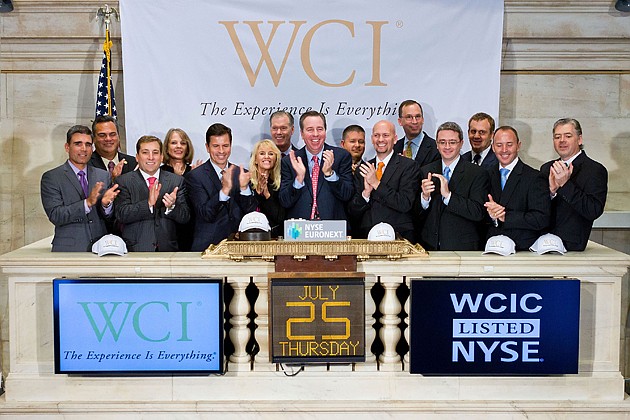- July 26, 2024
-
-
Loading

Loading

The good news for WCI Communities is that it builds only in Florida. The bad news is that it builds only in Florida.
That geographic concentration might help explain Wall Street's ambivalence toward WCI Communities, the Bonita Springs-based developer and homebuilder that recently began trading on the New York Stock Exchange (symbol: WCIC) after emerging from bankruptcy in 2009.
WCI CEO Keith Bass ticked off a series of positive developments in his first conference call with investors Aug. 20 since going public: The company reported a 144% increase in new homes delivered in the most recent quarter, revenues rose 72%, new orders increased 15%, the average sale price of new orders rose 20%, and profit margins widened.
How did investors react to the news? WCI's stock price barely budged, stuck in the $15.80 range following the earnings report.
J.P. Morgan analyst Michael Rehaut, who gave WCI a “neutral” rating after the earnings release, may be reflective of the perception on Wall Street. He listed WCI's Florida focus as both a reward and a risk.
“WCI is 100% exposed to Florida, and hence, faster/slower improvements in Florida's economy could drive higher/lower than expected order growth, which in turn could drive material upside/downside to our earnings estimates,” Rehaut writes in a note to investors.
That bipolar sentiment also may have been why WCI lowered its initial public offering price in July to $15 from as high as $23. After selling fewer shares to the public than anticipated, the company turned to the more generous credit markets to raise $200 million.
Despite this, WCI continues to push its Florida-centric strategy. The company controls 8,200 home sites and it is selling homes in 22 neighborhoods within 10 master-planned communities stretching from Tampa to Naples, on the east coast and in the Panhandle.
Bass makes a compelling argument: “Florida is the second-largest real estate market in the nation,” he says. While the number of Florida homebuilding permits has increased 61% so far through June, it may not be enough to satisfy the rising demand from aging boomers in particular. “Permits in 2012 were 77% off peak, so we think there's plenty of runway left,” Bass says.
WCI is more insulated from its peers from rising interest rates by the fact that 40% of its buyers paid all cash for their homes in the second quarter. WCI targets the move-up, second-home and active adult customers.
Only 12% of WCI's customers financed more than 80% of their home purchases in the quarter ended June 30. WCI's average selling price of a home at $441,000 is higher than many of its peers and rose 11% from the $398,000 in the second quarter of 2012. “We have very little cancellation activity,” says Bass.
In the second quarter, WCI's homebuilding revenues rose 146% to $53.8 million compared with the same quarter in 2012. Combined with its brokerage and amenities divisions, the company's revenues rose 72% in the second quarter to $83.3 million. The company swung to profitability in the second quarter to $8.2 million from a loss of $16.5 million in the same quarter last year.
In addition to the equity and debt sales, WCI says it expects to arrange another $75 million in borrowing capacity in the third quarter, enabling it to make more land acquisitions and continue to ramp up its homebuilding. “Florida continues to be a destination of choice,” Bass says.